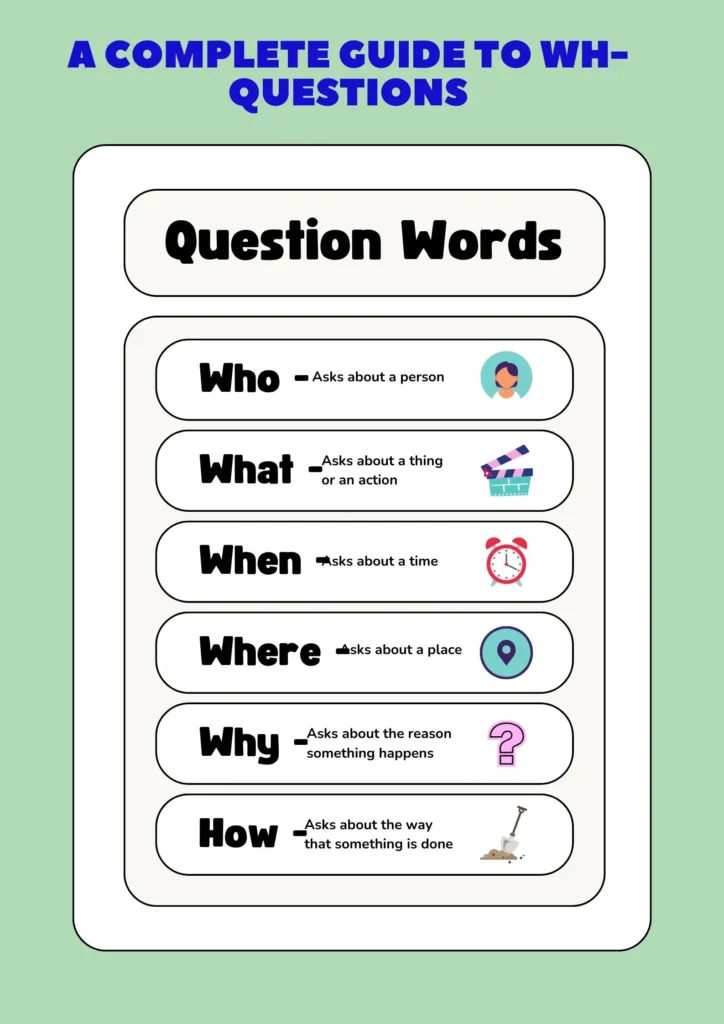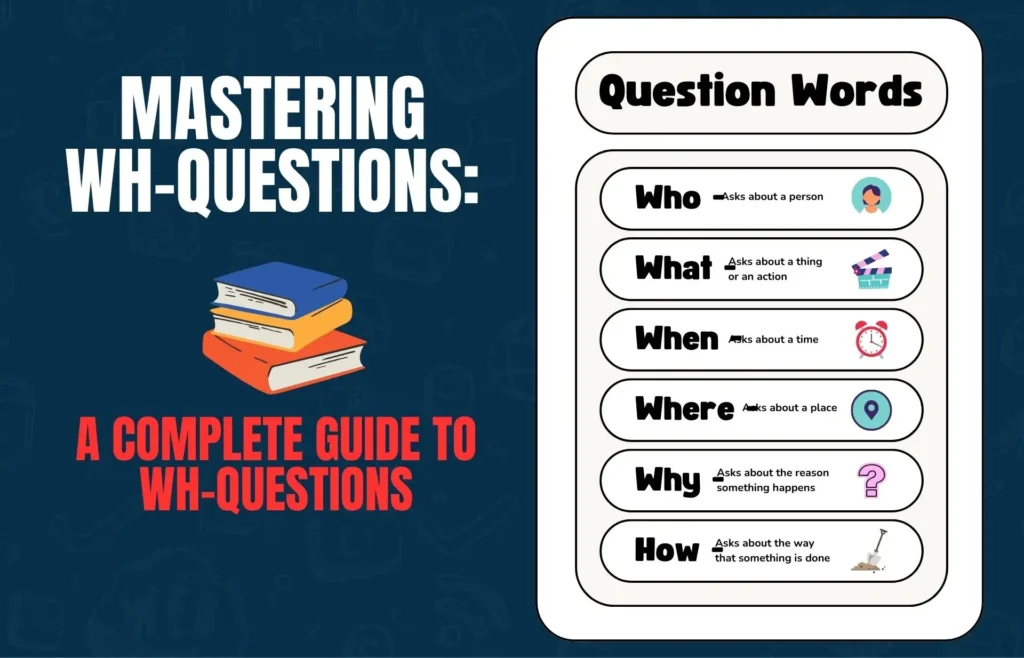Mastering WH-Questions: A Complete Guide to WH-Questions
Learning English is an exciting journey, and one of the most fundamental aspects of mastering English is the ability to ask questions. Questions are essential for gathering information, expressing curiosity, and keeping conversations flowing. In English, WH-Words play a crucial role in this process. WH-Words are question words that start with “W” or “H,” and they help us form questions that request specific information.
Whether you’re asking for a location, a reason, or the time, WH-Words enable you to gather precise answers. In this guide, we will explore the importance of WH-Words, their meaning, structure, and usage, ensuring that you can confidently use them in your daily conversations.
What Are WH-Words?
WH-Words are special question words that begin with the letters “W” or “H.” These words are designed to help you ask for specific pieces of information. They are the foundation of forming open-ended questions—questions that cannot be answered with a simple “yes” or “no.”

Here are the most common WH-Words:
What (কি): Asks for information or things.
When (কখন): Asks about time.
Where (কোথায়): Asks about a place.
Why (কেন): Asks for a reason.
How (কিভাবে): Asks about manner, condition, or degree.
Who (কে): Asks about a person.
Which (কোন): Asks for a choice or selection.
Whom (কাকে): Asks about the object of a verb (more formal).
Whose (কার): Asks about ownership or possession.
How many (কতগুলো): Asks about quantity.
How much (কত): Asks about price or amount.
How long (কত দিন/ কতক্ষণ): Asks about duration.
How often (কত ঘন ঘন): Asks about frequency.
How far (কত দূরে): Asks about distance.
How come (কেন): Informal way to ask "why."
Each of these WH-Words serves a different purpose, allowing us to ask for specific details. Let’s look at their meanings and uses in detail.
The Meaning and Use of Each WH-Word
What (কি):
Usage: "What" asks for specific information or things.
Example:
What is your name? (তোমার নাম কী?)
What time is the meeting? (মিটিংটি কখন হবে?)
What is your favorite color? (তোমার প্রিয় রঙ কী?)
When (কখন):
Usage: "When" is used to ask about time, either for a specific moment or a time period.
Example:
When is your birthday? (তোমার জন্মদিন কবে?)
When does the train leave? (ট্রেনটি কখন ছাড়বে?)
When will you arrive? (তুমি কখন পৌঁছাবে?)
Where (কোথায়):
Usage: "Where" is used to ask about a place or location.
Example:
Where do you live? (তুমি কোথায় থাকো?)
Where are we going? (আমরা কোথায় যাচ্ছি?)
Where can I buy a ticket? (আমি কোথায় টিকেট কিনতে পারি?)
Why (কেন):
Usage: "Why" is used to ask for a reason or cause.
Example:
Why is the sky blue? (আকাশ কেন নীল?)
Why are you sad? (তুমি কেন দুঃখিত?)
Why do you want to learn English? (তুমি কেন ইংরেজি শিখতে চাও?)
How (কিভাবে):
Usage: "How" is used to ask about manner, condition, or degree.
Example:
How are you? (তুমি কেমন আছো?)
How do you make this dish? (তুমি এই রান্না কীভাবে করো?)
How much does this cost? (এটির দাম কত?)
Who (কে):
Usage: "Who" asks about a person or people.
Example:
Who is that man? (ওই ব্যক্তি কে?)
Who is coming to the party? (পার্টিতে কে আসছে?)
Who helped you with the homework? (তোমাকে হোমওয়ার্কে কে সাহায্য করেছে?)
Which (কোন):
Usage: "Which" is used to ask about a specific choice or selection from a set of options.
Example:
Which book do you prefer? (তুমি কোন বইটি পছন্দ করো?)
Which color do you like best? (তুমি কোন রঙটি সবচেয়ে পছন্দ করো?)
Which restaurant do you recommend? (তুমি কোন রেস্টুরেন্টটি সুপারিশ করো?)
Whom (কাকে):
Usage: "Whom" is used to ask about the object of a verb, typically in formal contexts.
Example:
Whom did you invite to the party? (তুমি পার্টিতে কাকে আমন্ত্রণ জানিয়েছ?)
Whom are you looking for? (তুমি কাকে খুঁজছ?)
Whose (কার):
Usage: "Whose" is used to ask about ownership or possession.
Example:
Whose book is this? (এটা কার বই?)
Whose turn is it to speak? (কাহার পালা কথা বলার?)
How many (কতগুলো):
Usage: "How many" is used to ask about a countable quantity.
Example:
How many students are in your class? (তোমার ক্লাসে কতজন ছাত্র-ছাত্রী আছে?)
How many apples do you want? (তুমি কতটি আপেল চাও?)
How much (কত):
Usage: "How much" is used to ask about uncountable quantities, such as price or amount.
Example:
How much does this cost? (এটি কত দাম?)
How much water do you drink daily? (তুমি প্রতিদিন কতটুকু পানি খাও?)
How long (কত দিন):
Usage: "How long" asks about the duration of something.
Example:
How long is the flight? (ফ্লাইটটি কত ঘণ্টার?)
How long does it take to get there? (সেখানে পৌঁছাতে কত সময় লাগে?)
How often (কত ঘন ঘন):
Usage: "How often" is used to ask about frequency.
Example:
How often do you exercise? (তুমি কত ঘন ঘন ব্যায়াম করো?)
How often do you go to the movies? (তুমি কত ঘন ঘন সিনেমা দেখতে যাও?)
How far (কত দূরে):
Usage: "How far" asks about distance.
Example:
How far is the nearest hospital? (সর্বনিক হাসপাতালটি কত দূরে?)
How far is the beach from here? (এখান থেকে সৈকত কত দূরে?)
How come (কেন):
Usage: "How come" is an informal way to ask "why."
Example:
How come you're late? (তুমি কেন দেরী হলে?)
How come you didn’t attend the meeting? (তুমি কেন মিটিংয়ে অংশ নাওনি?)
How to Form WH-Questions Correctly
Forming WH-Questions in English involves a specific structure that helps ensure clarity and correctness. Let’s break down the most common formats:
Format 1: Question Word + Auxiliary Verb + Subject + Rest of the Sentence + ?
This is the simplest and most commonly used format.
6 Steps for Answering WH Questions: Here’s the breakdown:
- Question Word: The WH-word that begins the question (e.g., What, When, Where).
- Auxiliary Verb: The helper verb that follows the question word (e.g., is, are, will, do).
- Subject: The person or thing performing the action (e.g., she, he, they).
- Rest of the Sentence: The rest of the action or information.
- Question Mark: Always remember to end with a question mark (?).
Examples:
What is she reading? (সে কী পড়ছে?)
Where do you live? (তুমি কোথায় থাকো?)
Why is it raining? (বৃষ্টি কেন হচ্ছে?)
- Where do you live?
- When does the school start?
- Why did she leave early?
- How can I help you?
- What should we eat for dinner?
- Who is coming to the party?
- Whom did you invite to the wedding?
- Where can we find a good restaurant?
- Why are you so happy today?
- What time does the movie end?
- Who should I call for assistance?
- When did they arrive at the airport?
- How much does this cost?
- What did you buy at the store?
- Why is the sky blue?
- Where will you go for vacation?
- What time should I be there?
- Who is your favorite singer?
- Why are you wearing a hat indoors?
- How often do you exercise?
Format 2: Question Word + Auxiliary Verb + Subject + Main Verb + Rest of the Sentence
In this format, we include the main verb after the subject, which is typical when asking about actions.
- 6 Steps for Answering WH Questions: Here’s the breakdown:
- Question Word
- Auxiliary Verb
- Subject
- Main Verb
- Rest of the Sentence
- Question Mark
Examples:
When will they arrive at the airport? (তারা কখন বিমানবন্দরে পৌঁছাবে?)
How much does this shirt cost? (এই শার্টটির দাম কত?)
What time does the concert start? (সঙ্গীত সন্ধ্যা কী সময়ে শুরু হবে?)
Practice Questions with WH-Words
- Where did you go on vacation last year?
- When will they arrive at the airport?
- Why does she enjoy reading mystery novels?
- How can we improve our English skills?
- What should I cook for dinner tonight?
- Who is playing the lead role in the new movie?
- Whom did you meet at the conference yesterday?
- Where can we find a good cup of coffee around here?
- How often do you go for a run in the park?
- What time does the concert start this evening?
- Who can I talk to about this issue?
- When did they start the construction project?
- How much does this shirt cost?
- What did you purchase at the mall?
- Why is the sky so clear today?
- Where are you planning to go for your next vacation?
- What time do we need to be at the airport?
- Who sings your favorite song in that band?
- Why are you wearing a jacket indoors?
- How often do you go for a run in the park?

Here are some practice questions to help you get comfortable using WH-Words in different contexts:
- What is your favorite movie?
- When do you wake up in the morning?
- Where can I find a good restaurant around here?
- Why did you decide to go to college?
- How do you plan to spend your weekend?
- Who is the teacher of this class?
- Which book did you choose from the library?
- Whom did you meet at the party last night?
- Whose car is parked in front of the house?
- How many friends do you have?
- How much money do you need for this trip?
- How long will it take to finish the project?
- How often do you visit your grandparents?
- How far is your school from your home?
- How come you didn’t call me earlier?
Why Learning WH-Words is Important
Mastering WH-Words is crucial for several reasons:
Facilitating Communication: WH-Questions help you gather specific details, ensuring that conversations flow smoothly and you understand the context clearly.
Increasing Speaking Confidence: Learning how to use WH-Words correctly can help you speak more fluently and confidently.
Understanding Context: By asking precise questions, you can gain better clarity about different situations, whether it’s about time, place, reason, or manner.
Additional WH-Expressions and Variations
In addition to the basic WH-Words, there are also several advanced variations that allow you to ask more nuanced questions.
- Whoever (যে কেউ): Whoever finishes first will win a prize.
- Whatever (যা কিছু): Take whatever you need from the store.
- Whenever (যখনই): Call me whenever you need help.
- Wherever (যেখানে): Sit wherever you feel comfortable.
- Whichever (যে কোনটি): Choose whichever option you prefer.
- However (যেভাবে): However you choose to do it, I’ll support you
These variations give you more flexibility and allow you to ask more complex or conditional questions.
WH-Words are the backbone of effective communication in English. By mastering these essential question words and their structures, you can engage in clear, meaningful conversations and better understand the world around you. Practice using them in your daily interactions, and soon, asking and answering questions with confidence will become second nature.
We hope this guide has helped you understand WH-Words and how to use them. Keep practicing, and remember: the more you use WH-Words, the more fluent and effective you will become in your English communication!



